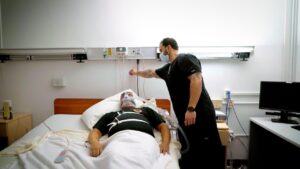
Human beings spend approximately one-third of their lives asleep, making sleep a vital aspect of our overall health and well-being. To fully understand the importance of sleep, it is essential to delve into the science behind it and explore the impact it has on our physical and mental well-being. In the beautiful region of Queensland, Australia, the Sleep Study Mackay has been diligently working to analyze sleep patterns and shed light on this fascinating topic.
Understanding the Importance of Sleep
Sleep is not just a period of rest and rejuvenation; it is a complex physiological process that allows our bodies and minds to recharge. During sleep, numerous restorative processes take place, including tissue repair, hormone regulation, and memory consolidation. Without adequate sleep, these essential functions become compromised, leading to a host of health issues.
Furthermore, Sleep Study Mackay tells the duration and quality of sleep can vary depending on individual factors such as age, lifestyle, and overall health. While adults typically require 7-9 hours of sleep per night, infants may need up to 14-17 hours, and teenagers often benefit from 8-10 hours of sleep. Understanding these differences can help tailor sleep habits to meet specific needs.
The Science Behind Sleep
When we fall asleep, our brainwaves transition through several stages, and each stage serves a different purpose. The initial stages are characterized by light sleep, while the later stages, called REM sleep, are associated with vivid dreaming. These cycles repeat throughout the night, and disruptions in these cycles can negatively impact the quality of our sleep.
Moreover, the body’s internal clock, known as the circadian rhythm, plays a crucial role in regulating sleep-wake cycles. This rhythm is influenced by external factors such as light exposure, meal times, and daily routines. Disruptions to the circadian rhythm, such as those caused by shift work or jet lag, can lead to sleep disturbances and overall fatigue.

The Impact of Sleep on Health and Wellbeing
Studies have shown that chronic sleep deprivation can increase the risk of developing various health conditions, including obesity, diabetes, cardiovascular disease, and mental health disorders. Additionally, poor sleep quality has been linked to daytime drowsiness, decreased cognitive function, and impaired immune system function.
Furthermore, the relationship between sleep and mental health is bidirectional, with sleep disturbances contributing to conditions such as anxiety and depression, and these conditions, in turn, exacerbating sleep problems. Addressing both sleep quality and mental health is essential for overall wellbeing and quality of life.
The Process of Sleep Study in Mackay
To gain a deeper understanding of sleep patterns and their impact on individuals in Queensland, the Sleep Study Mackay utilizes state-of-the-art sleep clinics and advanced monitoring equipment to observe and record sleep activity. These sleep clinics offer a comfortable environment conducive to restful sleep, ensuring accurate data collection.
Understanding the complexities of sleep is crucial for maintaining overall health and well-being. The Sleep Study Mackay team is dedicated to unraveling the mysteries of sleep through cutting-edge technology and expert analysis. By delving into the nuances of sleep patterns, they aim to improve the quality of life for individuals struggling with sleep-related issues.
The Role of Sleep Clinics
Sleep clinics play a crucial role in sleep studies. Highly trained professionals monitor patients as they sleep, collecting data on brain activity, breathing patterns, heart rate, and other physiological measurements. This information provides valuable insights into sleep disorders and helps formulate effective treatment plans.
Moreover, sleep clinics serve as a sanctuary for individuals battling sleep disturbances. The serene ambiance and personalized care offered at these clinics create a safe space for patients to relax and undergo monitoring without any stress or discomfort. The compassionate approach of the staff members fosters a sense of trust and reassurance, essential for a successful sleep study experience.
What to Expect During a Sleep Study
If you participate in a sleep study at the Mackay Sleep Study clinic, you can expect a comprehensive evaluation of your sleep patterns. Upon arrival, the friendly staff will guide you through the process, explaining the equipment used and answering any questions you may have. Once you are settled in, the monitoring devices will be attached, and you will be able to sleep comfortably while the study is conducted. Learn more about what to expect during a sleep study visit at https://www.ncbi.nlm.nih.gov/books/NBK355307/
During the study, every aspect of your sleep will be meticulously monitored to capture a detailed picture of your sleep architecture. The data collected will undergo thorough analysis by sleep specialists to identify any abnormalities or disruptions in your sleep cycle. This in-depth evaluation is essential for diagnosing sleep disorders accurately and tailoring personalized treatment plans to address your specific needs.

Analysing Sleep Patterns: A Closer Look
One of the primary objectives of the Sleep Study Mackay is to investigate common sleep disorders in Queensland and their prevalence in the population. By analyzing sleep patterns, researchers can gain insight into the factors affecting sleep quality and identify potential solutions to improve sleep health in the region.
Understanding sleep patterns goes beyond just the number of hours slept each night. Researchers at the Sleep Study Mackay delve deep into the intricacies of sleep architecture, exploring the different stages of sleep such as REM (rapid eye movement) and NREM (non-rapid eye movement) sleep. By studying these patterns, experts can uncover valuable information about the quality of sleep individuals are experiencing and how it may be impacting their overall health. Find more about NREM click here.
Common Sleep Disorders in Queensland
In their research, the Sleep Study Mackay has identified several common sleep disorders prevalent in Queensland. These include sleep apnea, insomnia, restless leg syndrome, and narcolepsy. By understanding the prevalence and characteristics of these disorders, healthcare providers can devise targeted interventions and treatment plans.
Sleep disorders can have a profound impact on an individual’s daily life, affecting their mood, cognitive function, and overall well-being. Through detailed analysis and diagnostic testing, the Sleep Study Mackay aims to not only identify these disorders but also provide personalized treatment strategies to help individuals manage their condition effectively.
The Influence of Lifestyle on Sleep Patterns
It is well-established that lifestyle factors can significantly impact sleep patterns. Factors such as stress levels, diet, exercise, and exposure to electronic devices before bedtime can disrupt sleep quality and quantity. Through careful analysis of sleep patterns, researchers aim to unravel the complex relationship between lifestyle choices and sleep disturbances.
In addition to lifestyle factors, environmental influences play a crucial role in shaping an individual’s sleep patterns. The Sleep Study Mackay investigates how external factors such as noise pollution, temperature, and light exposure can impact the quality of sleep experienced by individuals in Queensland. By understanding these environmental influences, researchers can recommend practical solutions to create optimal sleep environments for better rest and rejuvenation.
The Findings from Mackay Sleep Studies
The sleep studies conducted in Mackay have yielded valuable findings that shed light on sleep patterns and their impact on the population. By analyzing the data collected from numerous individuals, researchers have identified key trends that can inform strategies to improve sleep health in Queensland.
Furthermore, the Mackay sleep studies delved into the relationship between sleep patterns and mental health. Researchers found a strong correlation between poor sleep quality and increased risk of mental health disorders, such as anxiety and depression. This highlights the importance of addressing sleep issues not only for physical well-being but also for mental well-being.
Key Trends in Sleep Patterns
One significant trend observed in Mackay sleep studies is an increase in sleep disorders among the population. This increase can be attributed, in part, to lifestyle factors, such as higher stress levels and irregular sleep schedules. Additionally, certain occupations, such as shift work, have been found to be associated with higher rates of sleep disturbances.
Moreover, the research revealed a notable difference in sleep patterns between different age groups. Younger individuals were found to have a higher prevalence of sleep deprivation, possibly due to academic and social pressures, while older adults experienced more fragmented sleep, often linked to underlying health conditions.
Implications of Sleep Study Findings
The findings from the Sleep Study Mackay carry important implications for both individuals and healthcare providers. With a better understanding of sleep patterns and their impact on health, individuals can make informed decisions about their sleep hygiene and seek appropriate treatment if needed. Healthcare providers can use these findings to develop comprehensive sleep health programs and promote awareness about the importance of good sleep habits.
Additionally, the insights gained from the Mackay sleep studies can aid policymakers in implementing regulations that support healthy sleep practices in the community. By recognizing the factors contributing to poor sleep quality, authorities can work towards creating environments that are conducive to restful and rejuvenating sleep for all residents.
Improving Sleep Health in Queensland
With the knowledge gained from the Sleep Study Mackay, efforts can be made to improve sleep health in Queensland and reduce the prevalence of sleep disorders. By implementing strategies for better sleep hygiene and encouraging lifestyle modifications, individuals can optimize their sleep quality and overall well-being. Learn more about Sleep Study Adelaide Cost: Assessing Sleep Health Expenses in South Australia click here https://eyeshinning.com/sleep-study-adelaide-cost-assessing-sleep-health-expenses-in-south-australia/
Strategies for Better Sleep Hygiene
Improving sleep hygiene includes adopting practices that promote healthy sleep habits, such as maintaining a consistent sleep schedule, creating a relaxing sleep environment, avoiding caffeine and stimulating activities before bed, and practicing relaxation techniques. These simple changes can have a significant impact on sleep quality.
For instance, maintaining a consistent sleep schedule involves going to bed and waking up at the same time every day, even on weekends. This helps regulate the body’s internal clock, making it easier to fall asleep and wake up naturally. Creating a relaxing sleep environment can be achieved by keeping the bedroom cool, dark, and quiet. Investing in a comfortable mattress and pillows can also contribute to a more restful sleep.
Avoiding caffeine and stimulating activities before bed is another important aspect of sleep hygiene. Caffeine, found in coffee, tea, and some sodas, is a stimulant that can interfere with falling asleep. It is recommended to avoid consuming caffeine at least six hours before bedtime. Engaging in relaxing activities, such as reading a book or taking a warm bath, can help prepare the mind and body for sleep.
The Role of Healthcare Providers in Promoting Sleep Health
Healthcare providers play a crucial role in promoting sleep health among their patients. By staying updated on the latest research and providing evidence-based recommendations, healthcare professionals can guide individuals towards adopting healthier sleep practices. Additionally, healthcare organizations can prioritize sleep health as a vital component of preventive care.
For example, healthcare providers can educate patients about the importance of sleep and its impact on overall health. They can discuss the risks associated with chronic sleep deprivation, such as increased risk of obesity, diabetes, and cardiovascular diseases. By addressing any underlying sleep disorders, healthcare providers can help individuals find effective treatment options and improve their sleep quality.
Furthermore, healthcare organizations can implement policies that prioritize sleep health. This can involve incorporating sleep assessments into routine check-ups, providing educational materials on sleep hygiene, and offering resources for sleep disorder diagnosis and treatment. By integrating sleep health into the healthcare system, individuals are more likely to receive the necessary support and guidance to improve their sleep habits.
In conclusion, the Sleep Study Mackay’s dedication to analyzing sleep patterns in Queensland has provided valuable insights into the importance of sleep, the prevalence of sleep disorders, and strategies to improve sleep health. By understanding the science behind sleep, the impact it has on our well-being, and the role of lifestyle factors, we can make informed decisions to prioritize our sleep and take steps towards better sleep habits. With the collaboration of individuals, healthcare providers, and the community, we can work towards a healthier future with restful nights and vibrant days.


